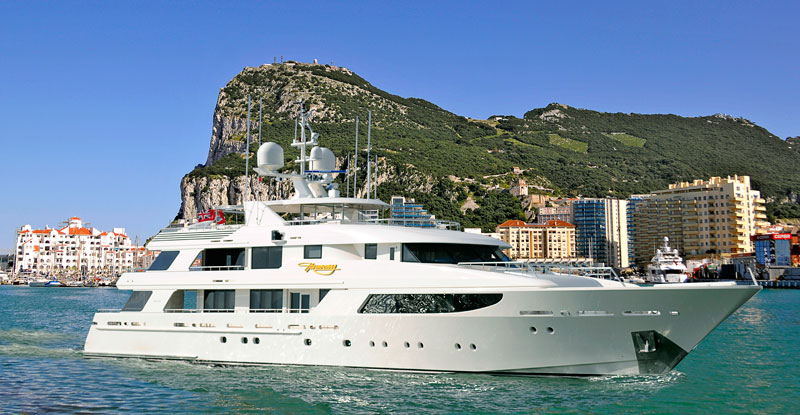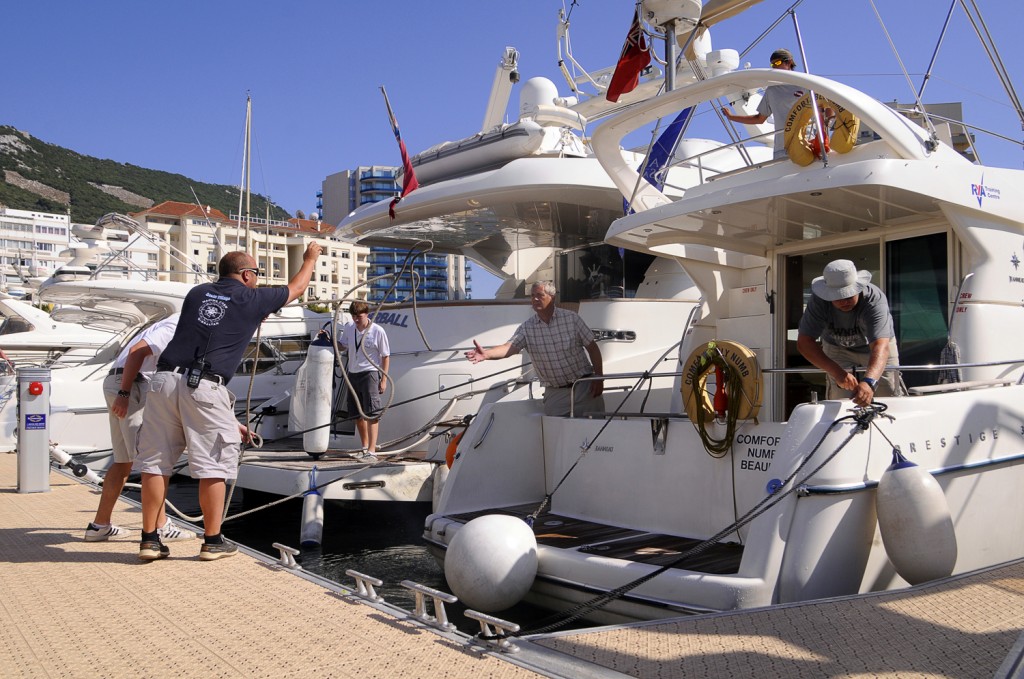Recent changes in legislation and a continuing improvement of facilities has led to an increased awareness of yacht registration in Gibraltar and an annual increase in the number of vessels making it their home port. So what’s the deal? We asked a local expert.
Contributed by Jonathan C. Stagnetto, FORM-A-CO (GIBRALTAR) LIMITED [www.formacogibraltar.com]
Gibraltar’s Advantages
The Rock’s situation at the gateway to the Mediterranean, its British Flag Registry and the facilities provided by its local marinas means that it is ideally placed to service all registration, mooring, repair and maintenance needs associated with the yachting world.
All vessels registered in Gibraltar are registered as British flag vessels with documentation being identical to the UK requirements and are required to fly the Red Ensign.
Gibraltar’s status within the EU exempts it from levying VAT on goods and services as it does not form part of the EU’s Common Customs Tariff area.
For this reason, if you register your yacht in Gibraltar you pay:
- No VAT in Gibraltar
- No Import Duty (if your vessel is not based in Gibraltar)
- No tax on the sale of your vessel
Under the laws applicable to yachts registered in Gibraltar in the name of limited companies it is:
- Not necessary for shareholders or company directors to be nationals or residents of Gibraltar
- Not necessary for the vessel to be surveyed annually
- Not necessary for the skipper to hold any form of mariner’s certificate in the case of pleasure yachts under 80 GRT.
Entitlement
The persons entitled to be owners of British Flag vessels registered in Gibraltar are:
- British nationals
- Citizens of the European Union resident anywhere in the EU.
- Companies incorporated in British territories and having principal places of business in these jurisdictions. Non-EU nationals can therefore make use of Gibraltar Companies as approved vehicles for the ownership of their yachts under the British Flag.
All vessels registered in Gibraltar, be they in the name of Gibraltar companies or EU citizens, are required to appoint Registered Agents in Gibraltar to attend to all Registry and Radio Licensing requirements for the vessels in Gibraltar.
Memo on VAT
Whilst we can confirm that any vessel being registered in Gibraltar is guaranteed that no VAT will be levied upon its registration, this does not mean that Gibraltar Registered vessels are exempted from paying VAT if they are operated by EU nationals sailing in EU waters.
If the above circumstances apply, it would certainly contribute to one’s peace-of-mind if VAT were paid on the vessel, and if the VAT receipt were to form part of the vessel’s papers. The reason for this is simply that VAT is likely to be levied against any vessel that spends more than 18 months at a time in EU CCT (Common Customs Tariff) waters, (regardless of whether the vessel is registered in Gibraltar or any other non-CCT port). Given that VAT only becomes payable on a vessel when it is first bought from a Builder or imported into the EU and not on any subsequent re-sale it may be useful, if only for re-sale purposes, to be able to prove that VAT had already been paid on it.
* N.B. Pleasure yachts built pre-1985 and in EU waters on 31st December 1992 are treated as VAT paid. It is now possible to obtain a special certificate of VAT exemption for vessels that meet these criteria, but this would require the vessel to be brought into EU waters, and for suitable evidence to be laid before the Customs authorities as to the date of build and its location on 31/12/1992.
Small vessels in Commercial Use
As an alternative to the payment of VAT, we can advise that small vessels in commercial use such as Charter yachts, are not only exempted from paying VAT on their purchase, but they are only obliged to pay VAT on the proceeds of any charter operations that they may choose to undertake while in EU-VAT waters.
Any Yacht under 24m in length can register as a Small vessel in Commercial Use. Indeed, it is possible to register a pleasure yacht from the outset, as a Small Vessel in Commercial Use. It is also possible to change the status of a yacht currently registered as a private pleasure yacht to one of a Small Vessel in Commercial Use. In either case the yacht must comply with the MCA rules for the SVC coding.
Once the SVC Certificate is obtained the Registration Certificate of the yacht is amended to show the status of the yacht as a Small Vessel in Commercial Use. If the yacht does not generate any income, then there is no VAT liability.
In order to obtain the SVC Certificate, the yacht must be surveyed for this purpose and the surveyor will draw up a list of any modifications that may need to be made to the yacht. If the yacht is a new build, modifications could be made prior to completion. A second hand yacht can also change its status from Private Pleasure Yacht to Small Vessel in Commercial Use.
A second (and sometimes a third) survey is required to inspect and pass the yacht for the coding. The application is then submitted to the appropriate authority who issues the SVC Certificate for the yacht. The Certificate must be renewed every year and the yacht is only exempt from VAT while it is coded. The yacht is not obliged to actually work in order to qualify for the coding or to maintain it. But it must comply with the coding requirements.
Depending on the value of the yacht, any costs for modifications could be considerably lower than the VAT on the value of the yacht. The cost of the arrangement fee and the coding survey procedure is dependant on the size and location of the yacht, the cost of modifications obviously depends on what has to be done, but competitive quotes can be obtained for any client.
An example of savings may be summarised as follows:
– 17.5% VAT on a yacht valued at GBP £750,000 would be GBP £131,350.
– Fees, Survey Fees and Disbursements of e.g. £8,000 + modification costs of e.g. £15,000 to allow the same vessel to obtain MCA coding could amount to GBP £23,000, resulting in a saving of £108,350. (These figures are just examples of costs)
Procedures for ownership of a vessel as an individual
If registration is to be pursued in the name of an individual as an EU national, there would be a number of documents that would be required to be completed in a particular manner in order to comply with Gibraltar Registry conditions. These would be:
1. A Bill of Sale (in a format compliant with Gibraltar Registry conditions which we would supply you with) to be signed by the vendor of the vessel before a Notary Public, a British Consul or a Commissioner for Oaths.
* N.B. In the case of a new vessel, if we are provided with the original Builder’s Certificate and the original invoice made out by the Builder in favour of the person who is to act as the vessel’s registered owner, it may well be possible to dispense with the need for the Bill of Sale.
2. Either the original Builder’s Certificate or a Notarised copy of the same.
3. Confirmation of the name of the vessel that is to be registered in Gibraltar.
4. In the case of an older vessel, we would ask for:
- A copy of the vessel’s current Certificate of Registration.
- Copies of all Bills of Sale tracking the ownership of the vessel from the Builders Yard to its current ownership.
- A copy of the passport of the previous owner who signed the Bill of Sale to sell the vessel to your name.
- A Deletion Certificate from its present Registry so that it may be able to seek registration under the British Flag.
5. A “Declaration of Ownership by an Individual” form which we would supply you with, and which would need to be signed before returning to us.
6. A copy of the Buyer’s passport.
7. An original utility bill, bank statement, credit card statement, copy of driving licence or ID Card, or similar document (not older than 3 months), to indicate proof of address for the buyer.
8. A Measurement and Tonnage Survey to be conducted by any one of the following Classification Societies:
- Bureau Veritas
- Lloyds of London
- Germanischer Lloyd
- American Bureau of Shipping
- Det Norske Veritas
- RINA
- The RYA
- The YBDSA
Procedures for ownership of a vessel in the name of a Company
In order to secure the registration of a vessel in the name of a Gibraltar company, you will need to have the following in place:
- 1. A Gibraltar Company. Please contact FORM-A-CO (GIBRALTAR) LIMITED for further information on this service : e-mail: formaco@gibraltar.gi , tel : + (350) 200 79959, fax: + (350) 200 79894)
2. A Bill of Sale (in a format compliant with Gibraltar Registry conditions which we would supply you with) to be signed by the vendor of the vessel before a Notary Public, a British Consul or a Commissioner for Oaths.
* N.B. In the case of a new vessel, if we are provided with the original Builder’s Certificate and the original invoice made out by the Builder in favour of the person who is to act as the vessel’s registered owner, it may well be possible to dispense with the need for the Bill of Sale.
3. Either the original Builder’s Certificate or a Notarised copy of the same.
4. Confirmation of the name of the vessel that is to be registered in Gibraltar.
5. In the case of an older vessel, we would ask for:
- A copy of the vessel’s current Certificate of Registration.
- Copies of all Bills of Sale tracking the ownership of the vessel from the Builders Yard to its current ownership.
- A copy of the passport of the previous owner who signed the Bill of Sale to sell the vessel to your name.
- A Deletion Certificate from its present Registry so that it may be able to seek registration under the British Flag.
6. A Measurement and Tonnage Survey to be conducted by any one of the following Classification Societies:
- Bureau Veritas
- Lloyds of London
- Germanischer Lloyd
- American Bureau of Shipping
- Det Norske Veritas
- RINA
- The RYA
- The YBDSA
If a vessel seeking re-registration in Gibraltar can produce certified documentation pertaining to any EU port authority confirming that the vessel is up-to-date in its compliance with their registration requirements, and assuming that this documentation meets with the approval of the Gibraltar Yacht Registry, then the requirements to have a Measurement & Tonnage Survey carried out on the vessel can be simplified via the re-calculation of the information appearing on these documents to meet British standards.
As you will note from the foregoing, the first step in securing the registration of a vessel in Gibraltar in the name of a Gibraltar company, should be the setting-up of the company itself which can then be named on the Builders Certificate or in the Bill of Sale as the Purchaser of the vessel.
The next step would be to obtain a Measurement and Tonnage Survey Certificate for the vessel from any one of the recognised Classification Societies named above. Once all of the conditions listed above have been met, then the registration of the vessel itself is a formality by comparison.
Radio Licensing for Gibraltar registered vessels
All vessels seeking registration in Gibraltar with radio and telecommunications equipment on-board are required to obtain a Radio Licence in Gibraltar through the Gibraltar Regulatory Authority. As Registered Agents for the vessel in Gibraltar, FORM-A-CO (GIBRALTAR) LIMITED would be well-placed to attend to this requirement on the vessel’s behalf.
Yacht Insurance in Gibraltar
Where possible, FORM-A-CO (GIBRALTAR) LIMITED will be pleased to assist with placing insurance for yachts at competitive rates through associate brokers linked to LLOYDS OF LONDON.
For further information please contact:
Jonathan C. Stagnetto
FORM-A-CO (GIBRALTAR) LIMITED
E-Mail: formaco@gibraltar.gi
Tel : + (350) 200 79959 begin_of_the_skype_highlighting end_of_the_skype_highlighting
Fax: + (350) 200 79894

















